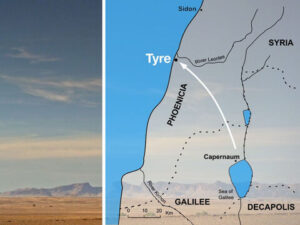We all want a revival. But are we really ready for it? And will we recognise it when it comes?
Picture this—a land for years barren and dry. Finally, finally it arrives—the refreshing rain the parched earth has been longing for. Yet something is wrong—really wrong. The soil, so dry and crusty, cannot receive the life-giving stream. Instead, water runs in huge sheets, cascading down to the lowlands. You look on, helpless, in shock and horror. It wasn’t meant to be like this! Instead of joy, more tragedy looms—devastating floods.
Could this be a picture of the current state of the affluent western church? Yearning for an outpouring of God but ignorant of what it might mean if it happens. Would a good God answer such prayers? Would you if you were God, knowing that such an outpouring was going to be short-lived and ultimately leave your bride severely shaken?
WHAT’S THE PROBLEM?
The writer to the Hebrews offers a stark warning: Learn from history—in this case, from the Israelites. They too were in a dry and hard place—the Sinai desert. He quotes King David’s words from Psalm 95:
Today, if only you would hear his voice,
8 “Do not harden your hearts as you did at Meribah,
as you did that day at Massah in the wilderness,
9 where your ancestors tested me;
they tried me, though they had seen what I did.
10 For forty years I was angry with that generation;
I said, ‘They are a people whose hearts go astray,
and they have not known my ways.’
11 So I declared on oath in my anger,
‘They shall never enter my rest.’” (Emphasis mine)
Meribah and Massah were places where the Israelites ran out of water. Instead of looking to God for his provision, the people grumbled and complained, going as far as to question God’s presence with them—thus testing God (see Exodus 17). Their question in v7, ‘Is the LORD among us, or not?’, highlights the core issue—hard hearts. All around them were signs of His presence—a fire in the sky giving light and warmth to each night, a cloud in the day providing shade, bread from heaven bringing sustenance every morning. How could they be so blind? Hard hearts.
Hard hearts, like hard soil, cannot receive life.
How did this happen? In a word, forgetfulness. They forgot God’s faithful presence even after He had shown His miraculous protection and provision week after week after week. In God’s words, ‘They tried [tested] me, though they had seen what I did’. Like the Pharisees of Jesus’ day who were obsessed with upholding the letter of the law, the Israelites were so fixated on their need for water that they were blinded to the very presence of God their provider with them.
A verse in Proverbs speaks to the heart of this:
Blessed is the one who always trembles before God, but whoever hardens their heart falls into trouble. Proverbs 28:14.
‘Trembling’ here in the original Hebrew, is due to awe. It brings to mind Israel’s jaw-dropping, knee-knocking reaction to God’s presence at Mt Sinai. God said at the time that ‘glory show’ was to instil godly fear to keep them from sinning (Ex. 20:20) The question beckons us, ‘Do we stand in awe of Him or have our hearts become hard too?’
Before you answer, let me unpack this a little more by looking at how God described the Israelites in this hard-hearted state.
GOD’S DESCRIPTION OF HARD HEARTEDNESS
In Ps 95 God, via David, said two things about their condition. One, they were ‘people whose hearts go astray’. In other words they, like the Pharisees of Jesus’ day, had become fixated on something other than the presence of God. They were ‘led astray’ from seeing God by something else. Water. Water—just like the Pharisees’ law-keeping—is good, life-giving and vital. Yet, it should never be more important than God.
When good distracts us from God we are in dangerous territory. For the Israelites, such a misfocus made them forget that God was in their midst—even with His wondrous ‘declaring’ from the sky. They took His supernatural presence for granted—no longer ‘trembling before’ our fearful consuming-fire God (see Hebrews 12:28-29). Could we, in our desire for the much-longed-for-revival, be guilty of a similar distraction?
Secondly, God said, ‘They have not known my ways’. Unlike Moses, who had a desire to know God, the Israelites seemed to be only focused on themselves—what they could get. In time—a very short time—their image of God was distorted.
David described the difference in another Psalm – 103. In verse 7 he wrote, He made known his ways to Moses, his deeds to the people of Israel. Israel knew God at a superficial level— a ‘that makes me feel great’ level. Moses on the other hand knew God as an intimate friend—he knew His ways. Moses wanted to ‘get’ God, not just get from God.
LEARNING FROM MOSES
What does Moses teach us that might help us avoid such an error? Moses went beyond the noise and smoke—and there was plenty of that! Yes, he wanted—and needed—the miracles of God, but he didn’t stop there. He wanted to know the God of the miracles. How was this evidenced? Moses took photos. Let me explain with a story.
Whenever we go to a significant event or have a special meal at our home, my wife invariably takes photos. It has become a bit of a chuckle point at times. However—jokes aside—what is my wife communicating with her shutter snapping? Value. These events are so important to her that she wants a permanent record of them.
Rewind to Moses’ day. How did people record memories of valuable events at that time? Stories and songs. The very things Moses used to embed the testimonies of God in his memory and that of the Israelites. His writings include the first five books of the bible—the Pentateuch. Some of his songs are recorded in Deuteronomy 32, Exodus 15 and Psalm 90.
These songs, like King David’s, speak of a deep and vital relationship with God. He knew God’s ways, His likes and dislikes—His personality. And he valued God’s character so much he wanted a permanent record of His wonders, both as a means of celebration and to ensure he would never forget them—nor let them be forgotten by the coming generations.
So, to reframe the question, ‘Do we have hard hearts?’ we could ask, ‘Do we value and celebrate what God has done and is doing now as we wait for what we are hoping and praying He will do in the future?’ Then going a step further, ‘Are we actually seeking after God—wanting to learn His ways—or are we subtly focused on something else and just looking to Him to meet our needs?’
WHAT SHOULD WE DO?
If we are more inclined toward the latter, if we are only interested in the ‘thrill’ of seeing signs and wonders, would God—or should God—pour out His Spirit? Jesus encountered the same attitude in His day. Jesus replied, “I tell you the truth, you want to be with me because I fed you, not because you understood the miraculous signs.” John 6:26. The signs were meant to point to Him—God in the flesh, their longed-for Messiah. Are we any different in our attitude to the longed-for revival?
If you have recognised your heart is ‘astray’, that your discontent is robbing you from focussing on God’s presence in your life now, there is hope. We, through our great High Priest Jesus, can boldly come to His throne of grace and receive mercy and grace (Heb 4:16).
If you have lost sight of the awe and wonder of knowing your creator and His ways and have fallen into serving Him primarily for what you can get, it’s time to get back to your first love.
Confess these things and receive His forgiveness. Then, run back to Him. Make every effort to renew your focus on His presence all around you, every day. Declare it. Record it. Sing about it if you dare. Call to mind the times where he has shown His faithfulness. Make this a declaration of faith as you wait for His ‘next’.
And, in the mysterious ways of our gracious and merciful God, this repentance might just be what ushers in ‘times of refreshing’—the first sound of the revival rain you’ve been longing for and are now ready to receive.





1 thought on “Revival. Are we ready? Will we recognise it?”
That is a great word there, and I agree that we have become so focused on being the hands and the feet. It a heart relationship and spending time with Him. I find myself being pulled in so many directions and distraction and your word is challenging, but refreshing You guys are a great team and keep snapping dear Sue., I love it. I still learning how much God loves me as well as wanting to know Him more.Yes you are both right blessing thestottlot